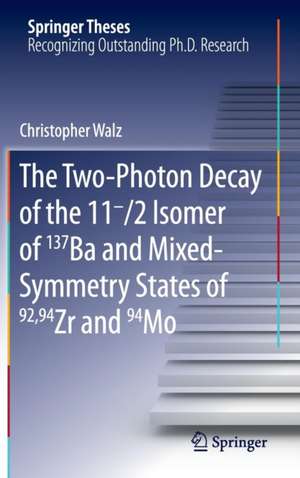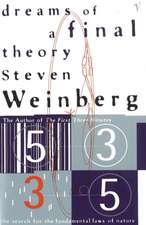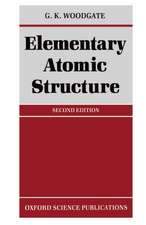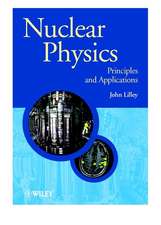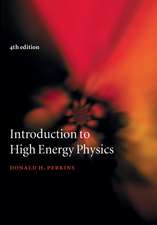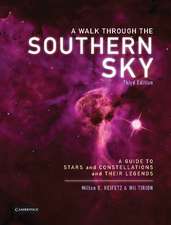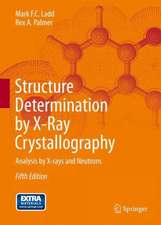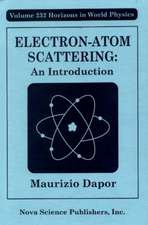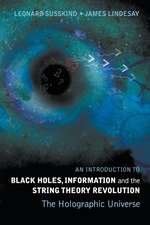The Two-Photon Decay of the 11-/2 Isomer of 137Ba and Mixed-Symmetry States of 92,94Zr and 94Mo: Springer Theses
Autor Christopher Walzen Limba Engleză Hardback – 8 feb 2016
| Toate formatele și edițiile | Preț | Express |
|---|---|---|
| Paperback (1) | 634.68 lei 6-8 săpt. | |
| Springer International Publishing – 30 mar 2018 | 634.68 lei 6-8 săpt. | |
| Hardback (1) | 640.71 lei 6-8 săpt. | |
| Springer International Publishing – 8 feb 2016 | 640.71 lei 6-8 săpt. |
Din seria Springer Theses
- 18%
 Preț: 997.88 lei
Preț: 997.88 lei -
 Preț: 389.88 lei
Preț: 389.88 lei - 15%
 Preț: 646.94 lei
Preț: 646.94 lei - 18%
 Preț: 943.43 lei
Preț: 943.43 lei -
 Preț: 399.29 lei
Preț: 399.29 lei - 18%
 Preț: 944.99 lei
Preț: 944.99 lei - 15%
 Preț: 636.80 lei
Preț: 636.80 lei - 18%
 Preț: 941.05 lei
Preț: 941.05 lei - 15%
 Preț: 643.16 lei
Preț: 643.16 lei - 15%
 Preț: 642.68 lei
Preț: 642.68 lei - 18%
 Preț: 1103.62 lei
Preț: 1103.62 lei - 20%
 Preț: 558.82 lei
Preț: 558.82 lei - 18%
 Preț: 1112.30 lei
Preț: 1112.30 lei - 18%
 Preț: 944.19 lei
Preț: 944.19 lei - 18%
 Preț: 1109.92 lei
Preț: 1109.92 lei - 18%
 Preț: 1217.27 lei
Preț: 1217.27 lei - 15%
 Preț: 640.06 lei
Preț: 640.06 lei - 15%
 Preț: 636.45 lei
Preț: 636.45 lei - 15%
 Preț: 640.06 lei
Preț: 640.06 lei - 15%
 Preț: 640.88 lei
Preț: 640.88 lei -
 Preț: 389.70 lei
Preț: 389.70 lei - 20%
 Preț: 563.89 lei
Preț: 563.89 lei -
 Preț: 393.35 lei
Preț: 393.35 lei - 15%
 Preț: 637.93 lei
Preț: 637.93 lei - 15%
 Preț: 641.85 lei
Preț: 641.85 lei - 18%
 Preț: 1225.94 lei
Preț: 1225.94 lei - 20%
 Preț: 551.36 lei
Preț: 551.36 lei - 18%
 Preț: 1229.10 lei
Preț: 1229.10 lei - 15%
 Preț: 639.25 lei
Preț: 639.25 lei - 18%
 Preț: 999.45 lei
Preț: 999.45 lei - 15%
 Preț: 640.06 lei
Preț: 640.06 lei - 18%
 Preț: 1220.45 lei
Preț: 1220.45 lei - 18%
 Preț: 1116.26 lei
Preț: 1116.26 lei - 18%
 Preț: 1110.72 lei
Preț: 1110.72 lei - 18%
 Preț: 1000.87 lei
Preț: 1000.87 lei - 18%
 Preț: 891.17 lei
Preț: 891.17 lei - 15%
 Preț: 640.06 lei
Preț: 640.06 lei - 5%
 Preț: 1154.07 lei
Preț: 1154.07 lei - 15%
 Preț: 635.96 lei
Preț: 635.96 lei - 15%
 Preț: 640.88 lei
Preț: 640.88 lei -
 Preț: 387.20 lei
Preț: 387.20 lei - 18%
 Preț: 1109.92 lei
Preț: 1109.92 lei -
 Preț: 385.25 lei
Preț: 385.25 lei -
 Preț: 385.25 lei
Preț: 385.25 lei - 18%
 Preț: 1112.30 lei
Preț: 1112.30 lei - 18%
 Preț: 999.45 lei
Preț: 999.45 lei -
 Preț: 386.99 lei
Preț: 386.99 lei - 15%
 Preț: 637.13 lei
Preț: 637.13 lei - 20%
 Preț: 554.20 lei
Preț: 554.20 lei - 20%
 Preț: 555.57 lei
Preț: 555.57 lei
Preț: 640.71 lei
Preț vechi: 753.77 lei
-15% Nou
Puncte Express: 961
Preț estimativ în valută:
122.60€ • 127.75$ • 101.51£
122.60€ • 127.75$ • 101.51£
Carte tipărită la comandă
Livrare economică 03-17 aprilie
Preluare comenzi: 021 569.72.76
Specificații
ISBN-13: 9783319271811
ISBN-10: 3319271814
Pagini: 160
Ilustrații: XV, 160 p. 71 illus., 62 illus. in color.
Dimensiuni: 155 x 235 x 11 mm
Greutate: 0.43 kg
Ediția:1st ed. 2016
Editura: Springer International Publishing
Colecția Springer
Seria Springer Theses
Locul publicării:Cham, Switzerland
ISBN-10: 3319271814
Pagini: 160
Ilustrații: XV, 160 p. 71 illus., 62 illus. in color.
Dimensiuni: 155 x 235 x 11 mm
Greutate: 0.43 kg
Ediția:1st ed. 2016
Editura: Springer International Publishing
Colecția Springer
Seria Springer Theses
Locul publicării:Cham, Switzerland
Public țintă
ResearchCuprins
Introduction.- Theoretical Background of the Two-Photon Decay Experiment.- Experimental Setup of the Two-Photon Decay Experiment.- Data Analysis and Results of the Two-Photon Decay Experiment.- Theoretical Background of the Proton Scattering Experiments.- The Experimental Setup at iThemba LABS.- Data Analysis and Results of the Proton Scattering Experiments.- Interpretation.- Summary & Outlook.
Textul de pe ultima copertă
This work focuses on new electromagnetic decay mode in nuclear physics. The first part of the thesis presents the observation of the two-photon decay for a transition where the one-photon decay is allowed. In the second part, so called quadrupole mixed-symmetry is investigated in inelastic proton scattering experiments. In 1930 Nobel-prize winner M. Goeppert-Mayer was the first to discuss the two-photon decay of an exited state in her doctoral thesis. This process has been observed many times in atomic physics. However in nuclear physics data is sparse. Here this decay mode has only been observed for the special case of a transition between nuclear states with spin and parity quantum number 0+. For such a transition, the one-photon decay – the main experimental obstacle to observe the two-photon decay – is forbidden. Furthermore, the energy sharing and angular distributions were measured, allowing conclusions to be drawn about the multipoles contributing to the two-photon transition. Quadrupole mixed-symmetry states are an excitation mode in spherical nuclei which are sensitive to the strength of the quadrupole residual interaction. A new signature for these interesting states is presented which allows identification of mixed-symmetry states independently of electromagnetic transition strengths. Furthermore this signature represents a valuable additional observable to test model predictions for mixed-symmetry states.
Caracteristici
Nominated as an outstanding Ph.D. thesis by the TU Darmstadt Presents the observation of a new electromagnetic decay mode in nuclear physics Provides a clear and reader-friendly introduction to the topics of the two-photon decay and mixed-symmetry states Presents a new signature for the identification of quadrupole mixed-symmetry states in spherical nuclei Includes supplementary material: sn.pub/extras
